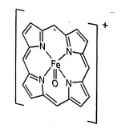Which of the following metalloproteins does not have iron in the active site?
1. Hemoglobin
2. Hemerythrin
3. Hemocyanin
4. Cytochrome c
Which of the following is a heme iron protein?
1. Rubredoxin
2. Transferrin
3. Hemerythrin
4. Cytochrome c
The reduction of nitrogen to ammonia, carried out by the enzyme nitrogenase needs
1. 2e-
2. 4e-
3. 6e-
4. 8e-
Carboxypeptidase contains
1. Zn2+ and hydrolysis CO2
2. Mg2+ and hydrolysis CO2
3. Zn2+ and hydrolysis peptide bonds
4. Mg2+ and hydrolysis peptide bonds
Iron-sulphur clusters in biological systems are involved in
1. proton transfer
2. atom transfer
3. group-transfer
4. e- transfer
Under physiological condition, oxygen is binding to deoxyhemoglobin the binding curve and its pH dependence, respectively are
1. Sigmoidal
2. hyperbolic
3. pH dependent
4. pH independent
Patients suffering from Wilson's disease have
1. Low level of Cu-Zn superoxide dismutase
2. High level of Cu-Zn superoxide dismutase
3. Low level of copper-storage protein, ceruloplasmin
4. High level of copper storage protein ceruloplasmin
The extent of electron conjugation in macrocyclic rings (i) heme, (ii) coenzyme B12 and (iii) chlorophyl follows the order
1. (i)>(iii)>(ii)
2. (i)>(ii)>(iii)
3. (iii)>(i)>(ii)
4. (ii)(i)>(iii)
Oxidized form of enzyme catalase (structure A); prepared by the reaction of [Fe(P)]+ (P=porphyrin) with H2O2 has a green colour because of

1. Oxidation state of iron changed from FeIII to FeIV.
2. Porphyrin ring is oxidized by one electron.
3. transition appears in the visible region
4. FeIV is coordinated with anionic tyrosinate ligand in axial position.
The cooperative binding of O2 in hemogoblin is due to
1. a decrease in size of iron followed by changes in the protein conformation
2. an increase in size of iron followed by changes in the protein conformation
3. a decrease in size of iron that is NOT accompanied by the protein conformational changes
4. an increase in size of iron that is NOT accompanied by the protein conformational changes






